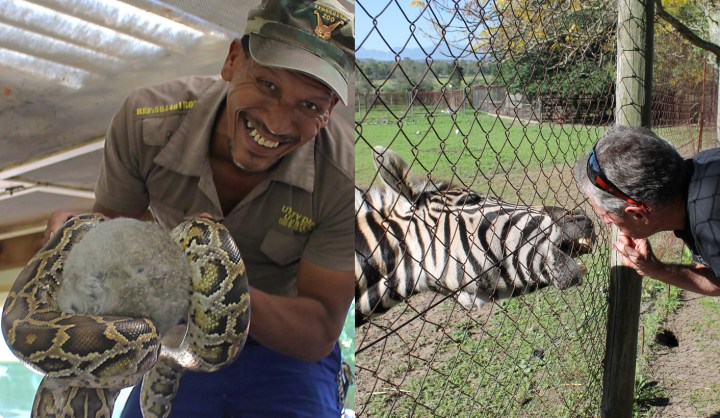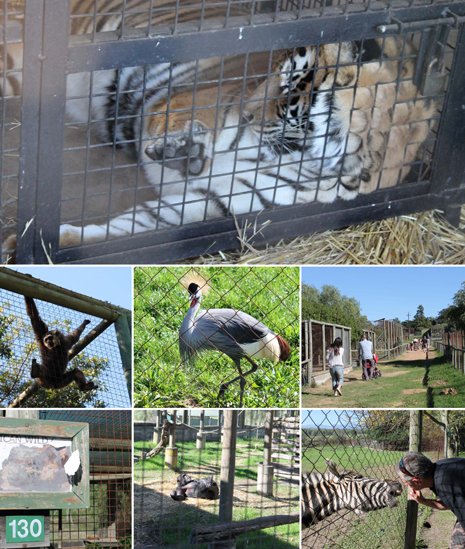Maverick Life, South Africa
We lost a zoo: Western Cape’s only zoo closes

It was announced last week that the Tygerberg Zoo would close by the end of the year. REBECCA DAVIS is one of countless Capetonians who has never visited it, thus contributing it its demise, so she went along to see what’s being lost.
A blonde motorist is driving along the motorway en route to Cape Town when she is flagged down by a truck driver who seems to have broken down.
Winding down her window, she asks “Can I help you, sir?”
“Are you going to Cape Town?” he asks. She confirms this.
“I have to stay here and fix my bakkie, but I have two chimps in the back that have to be taken to Tygerberg Zoo, and they’re already hot and stressed,” says the man. “If I gave you R500 for your trouble, could you take them to the zoo for me?”
The blonde agrees, and the two chimps are settled into the backseat of her car.
Four hours later, the truck driver is motoring through central Cape Town when, to his horror, he sees the blonde strolling down the street, hand in hand with the two chimps, to the amusement of a gathered crowd.
He screeches to a halt and runs over to her.
“What the hell?” he cries. “I gave you R500 to take these chimps to Tygerberg Zoo!”
“I did,” the blonde replies. “But we had money left over, so now we’re going to the aquarium.”
It’s a silly old joke, but it’s also a joke that will make no sense to future generations of Capetonians. By the end of the year, the Tygerberg Zoo will be history. The privately owned zoo, run by Lorraine Spence and her husband, John, until his death in 2010, can no longer make ends meet. Spence has sold the 40-hectare plot near Stellenbosch, and the animals are being sent off to other zoos and farms around the country.
Spence was unavailable for comment yesterday, but she told the Cape Times last week that the zoo was financially unsustainable, with animal feed costing R120 000 a month and staff salaries another R100,000.
The major reason Tygerberg Zoo is closing down – dwindling visitor numbers – was certainly not on display yesterday, a bright, unseasonably warm Cape Town Sunday. Visitors thronged through the entrance, with shrieking children sprinting off in pursuit of animals.
An employee who asked not to be named confirmed that it was “very, very busy”. She attributed the surge in visitors to the recent media reports, which have served to remind Capetonians of the doomed zoo’s existence. It doesn’t hurt either that since June 1 entrance prices have been slashed, in an attempt to woo in some last punters.
The employee described the decision to close the zoo as a “bombshell” and said she had only found out the previous day. “We are very concerned,” she said. There are 24 workers at the zoo, four of whom currently live on the plot. The longest-serving of these have been at the zoo since its establishment 33 years ago, in 1979.

Over the intervening decades, whenever the zoo has been in the media spotlight, it has generally been as a result of some breeding success. In 1998, the world’s tiniest tortoise was born at the zoo: a baby Namaqua Speckled.
A few years later, director John Spence made news internationally through his claim that he had found a descendant of the Cape Lion. Spence was reportedly fascinated by the Cape lions, which roamed the slopes of Table Mountain until the 1850s, and he obsessively read the journals of Jan van Riebeeck to gather information as to what they would have looked like. Among other distinct features, they had black manes.
Spence became convinced that some Cape lion cubs might have been brought back to Europe and interbred with European lions. He spent three decades searching for specimens that might fit the bill, not losing hope. His breakthrough came in 2000, when a friend sent him a picture of a lion in the Novosibirsk Zoo in Siberia. It had a black mane, wide face and sturdy legs. Spence told National Geographic that when he saw the picture, “every hair on my body stood upright”.
Novosibirsk Zoo agreed to allow him to bring the lion’s cubs back to Africa, and Spence and his wife flew home on Siberia Air with the cubs in a little travelling crate on the seat next to them. The Russian lions reportedly took to life at Tygerberg Zoo very easily, enjoying the warmth compared to Siberian conditions.
The lions are still around, as are the zoo’s famous chimps. Two were refugees from an abandoned zoo in Luanda, Angola. One was rescued from a Taiwanese fishing boat, where he had been kept chained onboard. Another two were gifts to Tygerberg Zoo from the late eccentric English philanthropist and zoo owner John Aspinall, who was a close friend of Mangosuthu Buthelezi.
A sign on the chimpanzee enclosure today mentions that one of the chimps, Bonnie, “was our tea party star until we stopped our tea parties in September 1989”. There are no further details, but one can imagine one reason for stopping them would be accusations of cruelty often attached to this kind of spectacle.
In 2001, Tygerberg Zoo made headlines of a different type when Wouter Basson told the Pretoria High Court that he had financial interests in the zoo and had used it to conduct experiments to do with crowd control on the animals. John Spence angrily denied the charge, saying at the time that “no experiment has ever been done or will ever be done on any animal at the zoo. I would not have permitted something so ludicrous.”
Despite the many visitors at the zoo on Sunday, the seeds of its demise were apparent everywhere, manifesting in a general sense of neglect. Cages were rusty, the grass overgrown and many enclosures lay empty. Sad-looking monkeys raked incessantly through the straw in their cage, as if seeking a clue as to their future. The unearthly shrieks of a solitary gibbon resounded throughout the zoo. Two Bengal tigers dozed in the shade, their tails lashing irritably.
The children who were present seemed to be having a whale of a time. Among the adults, sentiments were more mixed. “I came today because I read it was closing, and I haven’t been here since I was in the Cubs,” a 30-year-old trainee lawyer told me.
“The problem with this zoo is that people can’t interact properly with the animals, it’s not open like European zoos. There’s too much wire and stuff inhibiting you. I brought my camera and I haven’t taken it out of its bag once.”
A couple with a toddler explained that they wanted to show their daughter the zoo before it closed. “She always sees animals on Barney and her other TV programmes, so I wanted her to see them for real,” her mother said. Gazing around, she added: “I haven’t been here for years. It’s very sad that it’s closing.”
In front of a cage with a sign indicating it once housed a “Sacred Baboon”, but which is now just a storing shed for tools, I found the zoo’s reptile keeper, Abraham Snyman. “People call me AB,” he said.
Snyman, a weatherbeaten 52-year-old with a wide smile, has been working at the zoo on and off since 1985.
“I learned a lot here,” he said simply. “I came from a farm and I killed snakes every day, until Mr Spence taught me how to care for them.” Now he’s mad about snakes. “My computer is filled with snakes, my phone is full of snakes.”
Snyman wants to show me his favourite snake, but warns that they are busy eating. He unlocks a door which opens on to a small glass-fronted room in which an enormous albino python is slowly and deliberately swallowing a fat grey rabbit. “You don’t like it?” he laughs, seeing my horrified expression. “I like it.”
He picks up a boa constrictor, his favourite. She, too, is busily digesting a rabbit. “In winter I like to come here to relax, just sit with the snakes,” he says. “There are heaters, so it’s nice.”
Snyman isn’t sure where he’s going to go. He has a potential future job lined up, but there is confusion among the staff about when the final closing date will be. “In the beginning there were more animals,” he says, gesturing towards the enclosures. “Now lots of cages are empty.” Snyman trails off.
“For people working so long with animals, it’s hard to start again,” he says.
Read more:
- Tygerberg Zoo to close, on IOL
Photo by Jeanine Cameron

















 Become an Insider
Become an Insider